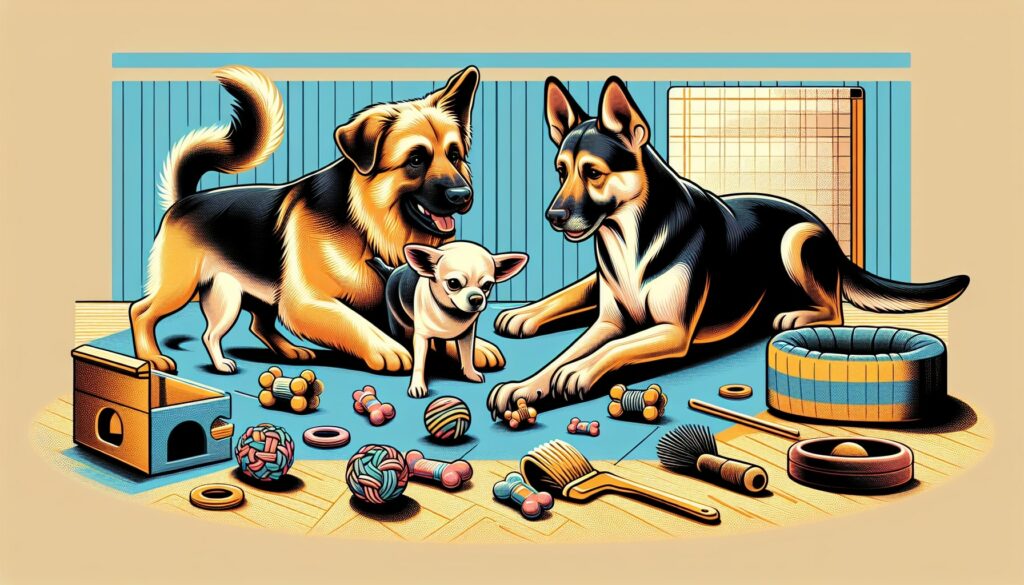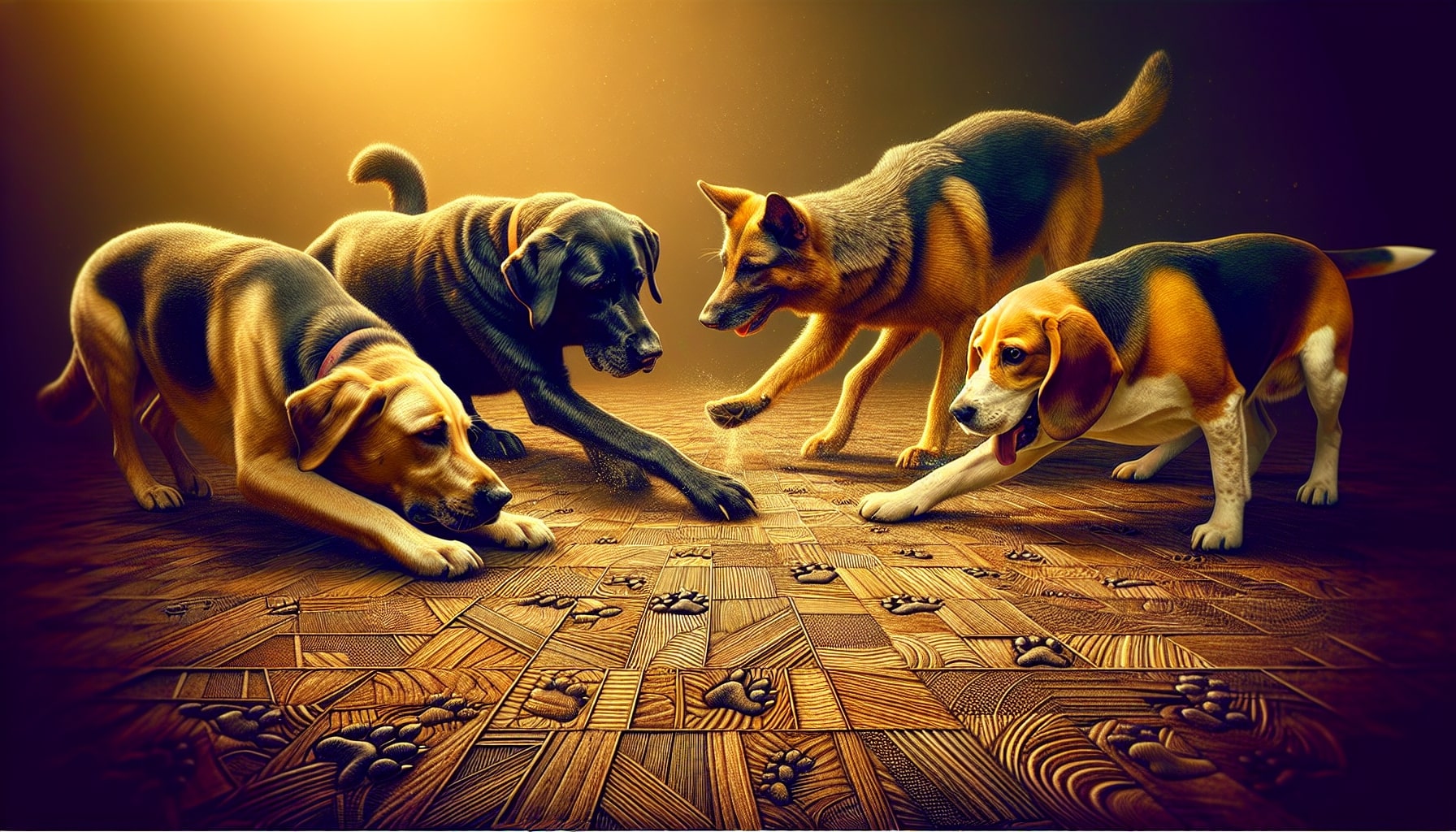Well, let’s jump right in, dear pet parents. Have you ever noticed your dog scratching at the floor seemingly without reason? You’re not alone! This is a common puzzle many dog owners face. There are several factors behind this intriguing behavior.
Do you want to know more about reasons why dogs scratch the floor? Then use the table of contents below to jump to the most relevant section. And you can always go back by clicking on the black arrow in the right bottom corner of the page. Also, please note that some of the links in this article may be affiliate links. For more details, check the Disclosure section at the bottom of the page.
Here's what we'll cover:
- What are the typical reasons behind dogs scratching the floor?
- How does floor scratching relate to a dog’s health and well-being?
- What can dog owners do to prevent or manage floor scratching?
- How to distinguish normal floor scratching from destructive behavior?
- Do certain breeds tend to scratch the floor more than others?
- What steps can be taken if a dog suddenly starts scratching the floor?
What are the typical reasons behind dogs scratching the floor?
Instinctual behavior
The first reason your dog is scratching at the floor is due to their primitive instincts. Wild dogs may scratch and dig to create a “nest” or a comfortable resting place. If you’ve ever noticed your dog scratches at the floor before settling down for a nap, this might be what’s happening. This habitual scratching, seemingly puzzling to us, might just be your pet harking back to their wild roots.
Marking territory
Scratching is also a way of marking territory. When your pet scratches at the floor, they’re actually depositing their scent from glands in their paws (who knew, right?), telling the world (or anyone who cares to sniff) that this is their domain.
Sensory stimuli
Coming in third, sensory stimuli. Yes, our lovely dogs use their paws to explore the world around them. The texture and temperature of a floor can provide all sorts of interesting information to a curious canine!
Nesting behavior
Now, let’s talk nesting. Female dogs, particularly pregnant ones, may scratch and dig more as their due date approaches. Humans get a nursery ready, dogs get a den ready. It’s the canine way! Your pregnant pooch might be preparing a safe, comfortable spot for her puppies.
Boredom and excess energy
A dog’s gotta do what a dog’s gotta do. And if there’s nothing else to do, digging at the floor it is! If Fido starts displaying an unusual interest in your flooring, consider entertaining alternatives. More playtime, a long walk with a dog walker, interactive toys – anything to keep boredom at bay.
How does floor scratching relate to a dog’s health and well-being?
Over to health concerns. In elderly dogs, scratching or digging can be indicative of cognitive issues or arthritis. If you suspect something may be medically amiss, it’s always better to err on the side of caution and consult a trusted vet. It’s crucial to ensure our fur-babies are not just entertained but also in good health.
Pheromone marking
Finally, here’s a fun fact. Dogs also have interdigital glands between their toes which may contribute to scent marking. When your dog scratches the ground, they’re broadcasting their presence and possibly their status (now, who’s been sleeping in my new bed?) to other dogs. Takeaway? Your pooch isn’t just scratching for no good reason – there tend to be at least 7 reasons, actually! So next time you see Fido passionately attacking your living room carpet, smile, shake your head, and appreciate his little canine quirks. This is just one more thing that makes dogs, well… dogs!’
Separation anxiety
It’s a two-word term that can turn any dog mom’s heart into mush — separation anxiety. It’s when our furry companions feel stressed or anxious when they’re left alone. More often than not, your pup with separation anxiety will latch onto your scent embedded in the carpet and start scratching to seek comfort, a common behavior amongst the furrier set.
Relief from discomfort or pain
When you spot your fur baby’s frantic scratching at the floor, it could be a sign of discomfort or, in worst-case scenarios, pain. The scratching behavior may provide temporary relief for your pup. Do not ignore these signs; at this juncture, a trip to the vet may be necessary.
Excessive scratching and gland issues
The reason behind this behavior could be something as simple but bothersome as gland issues. If you notice this behavior alongside other symptoms, like loss of appetite or frequent scratching, schedule an appointment with your vet for assistance.
Behavioral signs of illness
‘ An unexpected change in your dog’s behavior could signal a health issue. Noticing your pup more often scratching the floors? This could be a call for help. Your dog may be trying to manage his discomfort by scratching at the floor, so don’t wait and seek help from your trusted vet. ‘
What can dog owners do to prevent or manage floor scratching?
Understanding your pet’s needs and tendencies can make your journey of managing or preventing floor scratching smoother. Regular exercise and play can help your dog burn off excess energy, which could otherwise turn into anxious or destructive behaviors like scratching. Also, make sure their bedding is comfy and inviting so that they feel less inclined to burrow on your expensive rug.
Environmental enrichment and mental stimulation
A dog’s instinct to dig comes from their feral ancestors; it’s a part of their DNA. Stimulate their mind with puzzle toys that satisfies that instinct without ruining your carpet. An environment rich in stimuli can deter your puppy from exhibiting this behavior.
Regular exercise and playtime
A healthy dog is a happy dog. Regularly take your pup out for walks or engage in an energetic play session. This form of exercise will not only keep your dog physically fit but also help to burn off excess energy, which could be contributing to his “floor-fascination.”
Proper bedding and sleeping area
Consider this: would you be content sleeping on a cold, hard surface? Your pup craves the same comfort from his bedding as you do from yours. Invest in orthopedic or heated dog beds, particularly if your furkid is older or arthritic.
Veterinary consultation and behaviorist advice
When it comes to something as essential as your furkid’s health, a pet behaviorist or a veterinarian will be your best bet. Experienced professionals can provide effective and safe solutions, be it a trip to the vet to address any possible medical issues or a behaviorist’s comprehensive training plan to curb the habit.
Understanding breed-specific needs
There are as many reasons for your dog’s floor scratching as there are breeds. Dogs with strong digging instincts like terriers may require different solutions than breeds like bulldogs or greyhounds. Understanding your dog’s specific breed needs and instincts paired with appropriate environmental enrichment, can keep your wooden floors scratch-free and your companion content!
How to distinguish normal floor scratching from destructive behavior?
Going straight for the good stuff, remember that your furry friend is quite the explorer, and their curious noses often lead them to investigate every nook and cranny. Some light floor scratching is normal, a common reason for this may be that a dog is bored, seeking relief, or trying to get comfortable. However, destructiveness often occurs when they’re bore or left alone. If your pooch isn’t quite the Picasso you’d hoped and their floor ‘etchings’ start to resemble a Warhol gone wrong, it might be time to intervene.
Attention to frequency and intensity
Like us humans, dogs have their quirky habits. However, if you notice your furry friend’s floor scratching becoming a constant past time, then the frequency and intensity become issues. Too much of a good thing could mean an underlying medical condition, bad habits forming, or responses to loud noises.

Monitoring for specific triggers
In our homes, dogs are sent from the wild to the indoors. You might wonder if this is where the scratching instinct comes from – a throwback to their ancestors digging dens to give birth. But here, in our nests, their triggers might be a bit more… domesticated. Keep an eye on your pup around feeding times. A full mat could mean “time to dig!”. Also, be aware of their reaction to flower beds or if they’re zooming after hearing those dreaded loud noises.
Seeking professional advice for excessive scratching
Never ignore excessive scratching. As a responsible dog mom, I always recommend pet parents to seek professional advice for any drastic behavioral changes. They will rule out any underlying medical issues or analyze if any environmental factors are causing this.
Training and positive reinforcement
How many times have we wished for a manual to decode our fur-baby’s thoughts? Sadly, there isn’t one. But what we have is the power of training and positive reinforcement. Reward your pup for non-scratching behaviour and distract them from the scratching with their favorite toys. Remember, “Good dog!” is a melody to their ears.
Addressing anxiety and stressors
Back to those dens. Your indoors canine might be going through some anxiety. They could be missing the outdoor lawn or dealing with other stresses. If this is what’s causing the scratching, you’ll need to address that anxiety and take steps to make your dog feel safe and relaxed.
Do certain breeds tend to scratch the floor more than others?
In my research, I found out that it’s not specific to breeds, rather more to do with a dog’s personality. Though some breeds may show territorial habits which may include scratching, thanks to the special glands on their paw pads.
What steps can be taken if a dog suddenly starts scratching the floor?
There’s no need to fetch Dr. Watson. If your cosy companion suddenly starts floor-scratching, simply monitor their behavior. A vet check is always ideal to rule out ill health, followed by training, distraction, and managing their anxiety levels. Always remember – you are your furbaby’s world. The best thing you could do for them is to understand their needs and help them navigate this human world.
Thanks for the blog graphics: Canva.com
Doghint.com is a participant of several affiliate programs. The list includes (but not limited to) the following: VigLink, Refersion, ShareASale, and Amazon Services LLC Associates Program, an affiliate advertising program designed to provide a mean for us to earn fees by linking to Amazon.com and affiliated sites. Doghint.com does not intend to provide veterinary advice. All published articles are meant for informational purposes only and not substitute the professional veterinary consultation.


